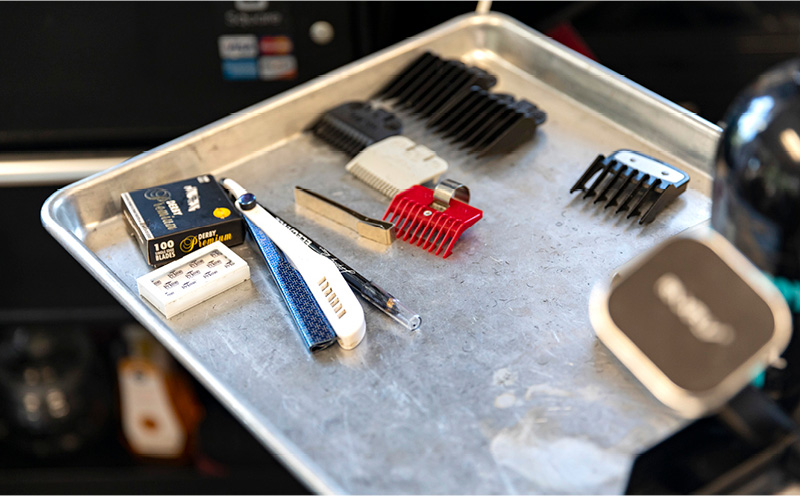Photography by Rafael Tongol
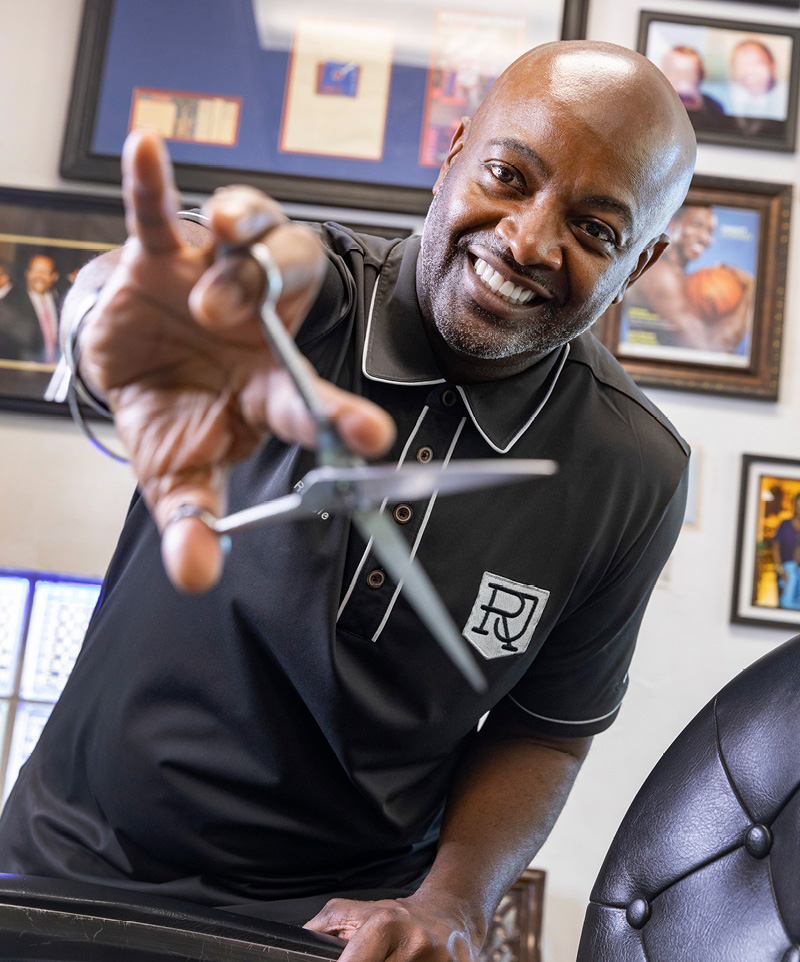
No one at West & Kennedy is named West or Kennedy, and you won’t find the Winter Park business at the corner of West and Kennedy because there are no streets in the city with those names. The moniker suggests lawyers, accountants or interior designers — pretty much anything but what it is: a barbershop transplanted from Eatonville.
Located at the corner of West New England and Pennsylvania avenues in the historic Hannibal Square business district on the city’s traditionally African-American west side, West & Kennedy sits squarely at the intersection of the city’s storied past and evolving future.
Reggie Jones’ shop is now, as nearly as can be determined, the only Black-owned business where African-American enterprises — banks, grocers, theaters, nightclubs, ice cream parlors, and candy and soda shops — once thrived before a period of decay and decline in the 1980s and 1990s.
Then gentrification and boutique culture changed the west side’s commercial district. West New England Avenue is now a cavalcade of storefronts for high-end products and services such as medical spas, title agencies, luxury real estate, proms and weddings, beauty salons, and an EPCOT-worthy array of ethnic restaurants including Mexican, Italian, French and Indian.
The nearest soul food restaurant is in downtown Orlando. A hair salon next door to West & Kennedy — Royal Salon and African Boutique — closed about five years ago. But at one time, there were more than two dozen Black-owned businesses in Hannibal Square, says Fairolyn Livingston, 74, a local historian who was born at home on the city’s west side.
The African-American presence today has been reduced to Jones’ establishment, an obelisk across the street in front of Shady Park commemorating the historic neighborhood and the Hannibal Square Heritage Center, where displays and oral histories preserve memories of the neighborhood’s past. “For me it’s like being a stranger in our own land,” Livingston says.
The irony is not lost on Jones, 51, but it’s just not the point. “It doesn’t mean anything to me,” he says. Jones is too busy cutting hair and running a business to spend time pondering the curiosity of his status as the solitary Black proprietor in Hannibal Square, which was set aside for Black businesses by the city’s founders in the 1880s.
As a U.S. president once said, it is what it is. But make no mistake: Jones is keenly aware of “it,” runs his business in a way that he believes will allow him to survive and thrive in an area that’s both steeped in history and enlivened by activism over issues of inclusion and representation.
Which brings us to the delphic name: West & Kennedy. When Jones opened the shop in 2009, it carried the same name as his successful shop in neighboring Eatonville: Superman Fades to Fros, a bow to his most famous client, former Orlando Magic center Dwight Howard, dubbed “Superman” for his soaring slum dunks. The eight-time All Star now plays for the Los Angeles Lakers.
Jones found that the words fades and fros — hair styles popular among Black men — didn’t resonate in Winter Park as they had in Eatonville. He had encountered the same problem with a short-lived shop in the Dr. Phillips area, prompting him to change the name from Superman Fades to Fros to Superman Pro Barber Shop.
“It was a great location right off Turkey Lake Road,” Jones says. “The name change came when I realized Fades to Fros was like an urban name for the urban community. Most people didn’t know what we were doing.”
It pained Jones to drop a name that had brought him a star-studded list of friends and clients from the world of sports, music, acting, journalism and haute cuisine. But being a clear-eyed realist, Jones saw the same writing on the wall for the Winter Park shop. In 2010, he changed its name to West & Kennedy, a subtle homage to the shop in Eatonville, which closed in 2016.
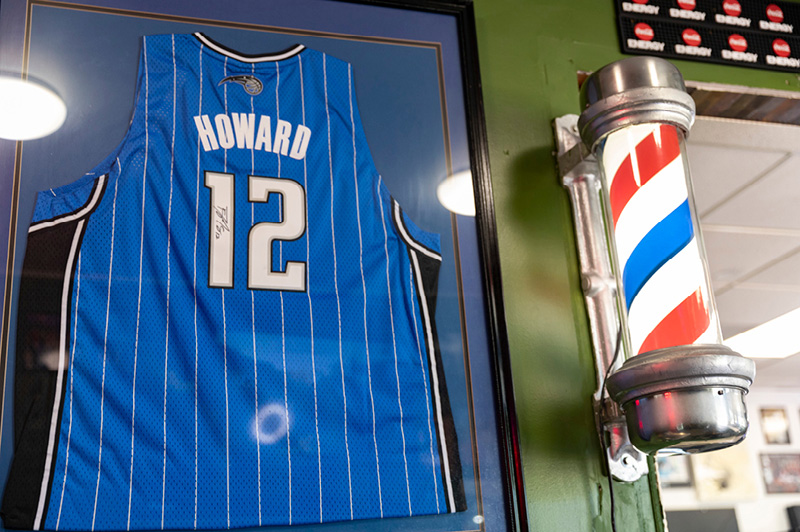
FROM FADES TO FROS
Reggie Jones was born in Gainesville and grew up an only child in Williston in nearby Levy County. His father died when he was young. After graduating from high school in 1987, Jones moved to Orlando with a culinary career in mind.
He landed a job at EPCOT working as a line cook under legendary chef Shawn Loving, who was summoned by the NBA this summer when players in Disney’s Wide World of Sports “bubble” found the fare most foul. But Jones kept returning to fond memories of childhood, when his mother cut his hair.
“I always liked the idea of being a barber because my mother was a hair stylist,” he says. “That got me intrigued. I realized that was my true passion. They had this great [barbering] program out in Houston, so I took my chances and moved to Texas. From there things started blossoming.”
The owners of the barber school where Jones learned his trade were so impressed by his enthusiasm and aptitude that they invited him to train as an instructor, he says. He taught barbering until 1998, by which time he was married with two young sons. His wife, from whom he is now divorced, had 10 siblings in Central Florida, so the family returned.
Jones joined an Eatonville shop where he rented a chair — a common practice in the barbering business — and was soon attracting a parade of clients. “The owner had an issue with that,” he says. “I was growing so fast, I got kicked out of the shop.”
He spent 18 happier months at a shop on Forest City Road. But when the owner closed the business, Jones returned to Eatonville, the oldest Black-incorporated municipality in the U.S., and found a location where he could go out on his own. His former co-workers followed him and became employees of Fades to Fros.
As in many Black communities, the business quickly became as much a community center as a barbershop. Penny Jordan, a Maitland photographer, shot countless rolls of film in Jones’ decidedly old-school operation for a pair of black-and-white photography exhibitions that have been displayed at Orlando City Hall and the Crealdé School of Art.
“Every time I walked into the shop, time stopped,” says Jordan. “There was connection, there was conversation, there was counseling. A moment of pause in a fast-paced world.” Traditional barbershops, she adds, “are one of the last places where people connect; one of the last places where there’s something inimitable — something beneath the surface we don’t pay attention to anymore.”
Fades to Fros benefited from word-of-mouth advertising that money can’t buy. DJs at Black-oriented radio stations gravitated to the shop and would always give the business a shout-out on the air.
Tampa Bay Bucs players who were training at Disney also found their way to Eatonville, at times causing the shop’s small parking lot to resemble an exotic car emporium. Some of the star power of his clients rubbed off on Jones, who soon found himself being profiled in magazines and included on lists of best barbers.
“Business was growing, and barbers wanted to come work at a well-known shop,” Jones says. Other Magic players, coaches and executives became regulars — including former player and general manager Otis Smith. Often, the Magic players brought along visitors such as superstar Kevin Durant, now a power forward with the Brooklyn Nets.
From outside the arena of sport came the likes of comedian-actor Chris Tucker, Grammy-winning rapper-producer Rodney Jerkins and sportswriter-broadcaster (and former Orlando Sentinel sports columnist) Jemele Hill. Low-key Eatonville, it seemed, had become home base for a barber to the stars.
Even Jones’ erstwhile employer, Shawn Loving — whose fare is favored by NBA players and who has worked as personal chef to Chauncey Billups, Ben Wallace, Tayshaun Prince and Rasheed Wallace of the Detroit Pistons — patronized Fades to Fros.
It was all good. And likely would have been the final career chapter for Jones if he hadn’t been approached by an anonymous “angel” to continue a legacy at the corner of West New England and Pennsylvania.
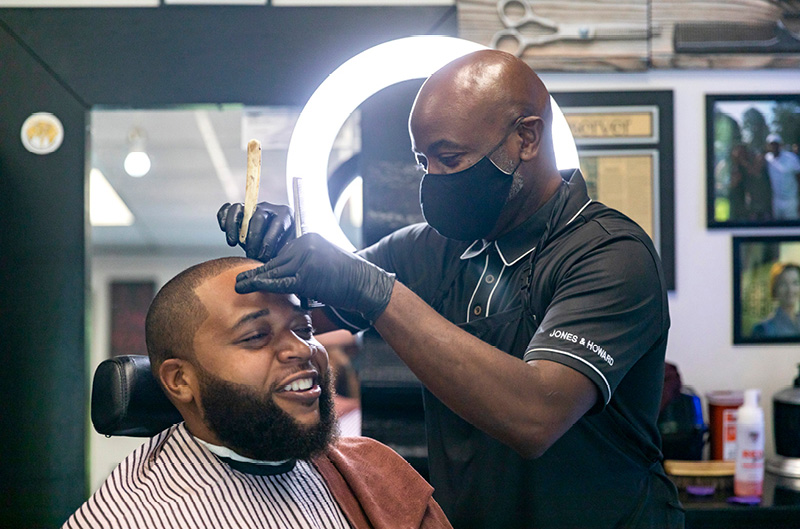
REIMAGINING A LEGACY
There had been a Black-owned barbershop on the corner for more than 60 years — but the storefront was now vacant. Would Jones be interested in relocating his business? The angel said she could connect Jones to the owner of the building, Darryl E. Straughter, an African-American property investor and school administrator who lived in Brooklyn but was born in Winter Park.
Straughter’s father, known as “Speight,” had operated a drug and sundry shop in Hannibal Square in the 1940s, so given that background his son would likely have been eager to encourage Black-owned enterprises in the old neighborhood.
“To this day I don’t know the name of the person who made the connection,” says Jones. “That’s why I call her an angel. But she gave me the opportunity to continue the legacy. All I had to do was continue growing.”
Mission accomplished. West & Kennedy has continued to grow, but into something quite different and more reflective of what the business district has become. It’s a safe bet, for example, that West & Kennedy is the first barbershop in Hannibal Square to have a consultant with bachelor’s and master’s degrees in hospitality management.
Allen English, 31, is a client who became Jones’ advisor two years ago. English, a graduate of UCF’s Rosen College of Hospitality Management and Cornell University’s SC Johnson College of Business (otherwise known as “The Hotel School”), has become one of Jones’ most vocal boosters and an ideological soulmate.
“We’ve kind of changed the vision of what it means to have a Black-owned barbershop on this corner,” says English, who notes that West & Kennedy attracts a multiracial clientele. Indeed, on any given day, the customers coming and going from Jones’ shop appear as diverse as a carefully curated CNN focus group.
English, who grew up in Lake Mary, says he was looking for an African-American barber when he discovered Fades to Fros as a college student in 2007. “I found a barber shop that made me feel welcome,” he says. “Also, at that point Reggie was Dwight Howard’s barber, so the appeal of his celebrity also attracted me.”
But it was Jones’ skill with a pair of hair clippers that kept him coming back. When he was away at Cornell, English adds, he let his hair grow out. “I wouldn’t get my hair cut for four or five months because I just didn’t trust anyone else,” he says. “I’d wait until I came home to have Reggie do it.”
English, who in 2013 started a consulting firm called Horseshoe Hospitality, says he and Jones are considering ways to engage the community and promote social equity. And they’re seeking guidance from people who share their passion for leaving the world a better place than when they found it.
“Reggie reached out a few years ago,” says John Rivers, philanthropist and owner of The Coop and 4 Rivers restaurants. “When someone isn’t trying to sell me something or asking for a donation, I’m willing to sit down and have a cup of coffee. What I saw in Reggie is that he’s got such a pure heart. He’s trying to be successful but wants to impact lives. He’s a special individual with a special business.”
Haircuts at West & Kennedy are by appointment only. With just three chairs, the stylish interior is cozy and serene — and you won’t find customers waiting four and five hours for a haircut, as an amazed Penny Jordan did in Eatonville when taking photographs at Fades and Fros.
Sometimes, Jones even tackles dire hair emergencies. “My granddaughter called me in tears when she was coming home from college,” says Winter Park Realtor Lief Erickson. “Someone screwed up her dreads, or whatever the kids call it. She said, ‘Grandpa, I need a Black woman to do my hair because a white woman just ruined my head!’ I took her to Reggie’s and she just fell in love with the place.”
Just another day at the office for Jones. “I see ’em all the same,” he says of his rainbow-coalition clientele. “I’ve been around money and I’ve been around wealth. I’ve been around a lot of things I didn’t come from. My exposure to athletes and entertainers and other business guys — they made me comfortable with that. We try to take care of the entire community.”
And there are Winter Parkers — especially those with a sense of history — who understand the symbolic importance of West & Kennedy. One of them is Mike Winn, partner of Erickson’s in ComReal Orlando, a commercial real estate brokerage on Morse Boulevard. When Straughter died in 2011, Winn immediately bought the building in which Jones now plys his trade.
“The location intrigued me,” says Winn. “I had no prior aspirations for researching Black heritage or business, but I became interested in the history of Hannibal Square. There’s been a Black-owned barbershop on that corner for many years, and I wanted to preserve that. I did all I could as a landlord to make sure Reggie was going to make it.”
Jones says that Winn’s support has been crucial. “If it wasn’t for Mike Winn, there wouldn’t be a West & Kennedy in Hannibal Square,” he notes.
But the question remains: is West & Kennedy an anomaly or can other Black-owned businesses survive in Hannibal Square? Such speculation is not unimportant to Jones, who at once is proud of his stature as a survivor but determined to reach beyond race and become a community institution in which the color of one’s skin is irrelevant.
Perhaps both goals can be achieved. English recalls that he and Jones had dinner together at Chez Vincent, next door to the shop, on June 19, otherwise known as Juneteeth — the day on which the emancipation of enslaved people in the U.S. is commemorated. Earlier that day, Black Lives Matter protesters had marched along nearby Park Avenue.
The pair happened to sit next to a white couple who had participated in the march. “We talked about the movement, and also about dessert,” recalls English. “They asked us if we had tried the chocolate soufflé. We said no, and they said, ‘We’re going to buy you dessert.’”
Later, the couple bought dinner for Jones and English. “It was an incredible gesture given the climate that day,” English recalls. “What they did should be seen as a model for how a small gesture can go a long way in changing perspectives and bringing people together.”
‘EMBRACE OUR COMMONALITIES’
Most of the wall space in West & Kennedy is taken up by colorful photos of athletes, game jerseys and other memorabilia. But two black-and-white photographs speak volumes about Jones and how he perceives and engages with the world around him.
The larger of the prints shows the Rat Pack — Dean Martin, Frank Sinatra and Sammy Davis Jr. — in their Las Vegas heyday. At first blush it seems an outlier, a cultural antique.
“That was Reggie’s idea,” English says, noting that Sinatra broke racial barriers by befriending Davis and refusing to perform in venues with discriminatory practices. “This is the message we want to convey,” he notes. “To embrace our commonalities, to positively lift up and support each other — not tear each other down because of differences.”
The other photo was a gift from Penny Jordan, who admires Jones for continuing the tradition of operating a Black-owned barbershop on that corner in Hannibal Square. But she makes no secret of her disenchantment with its current iteration. “I would never photograph it,” she says. “It’s too modern for me.”
That was a criticism that might sting a lesser man. But not Jones, who recently called Johnson and asked her to stop by the shop when she was in the neighborhood. “I get there, and he pulls out a photograph,” Johnson recalls. “It’s me at the Crealdé show. He says, ‘I want you to sign this.’ I wrote, ‘Thank you for being part of the barbershop documentary.’
“It’s on the wall right above a little table with his barber tools. He’s got me front and center! I said, ‘You gotta take me down, Reggie.’ He just smiled and said: ‘No, you mean the world to me.’”
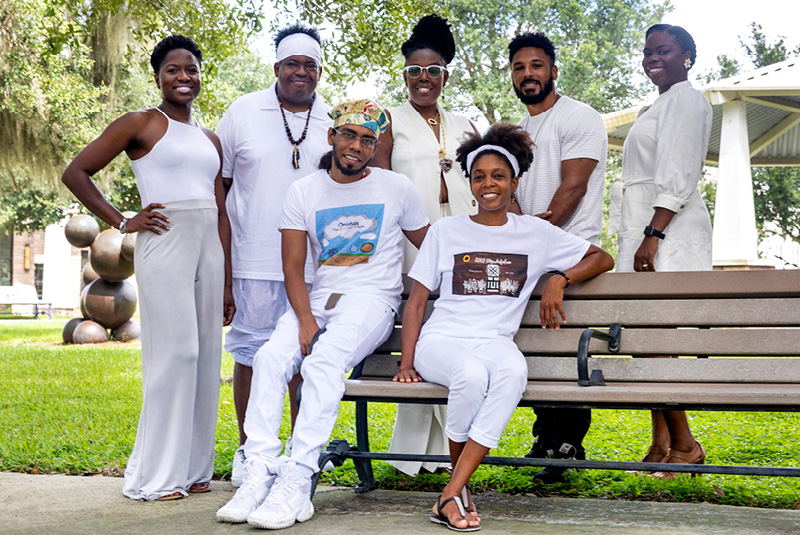
‘SOKO’ CULTIVATES ENTREPRENEURS
Moving from Atlanta to Winter Park in 2012 was “cultural whiplash” for LaWanda Thompson. The only store she could find in the community that carried her favorite soap was Royal Salon and African Boutique on West New England Avenue in Hannibal Square. “In Atlanta you can find it anywhere,” she says.
Royal Salon shut down five years ago, leaving Reggie Jones’ West & Kennedy barbershop next door as the only Black-owned business in a commercial district that once had many such enterprises.
“Now if I want to get an African-American type product, I have to leave my community,” Thompson says. “I have to go downtown [Parramore] or even Ocoee, Sanford or Longwood. Nobody is paying attention to all this, and it’s wrong.”
Correction: LaWanda Thompson is paying attention — and the record shows that attention must be paid to the 42-year-old activist and mother of three who has emerged as a forceful advocate in the local African-American community.
In 2018, Thompson — working with other mothers of color — created The Equity Council Corporation, a multifaceted nonprofit that promotes economic and political justice while advocating for enhanced educational offerings in local public schools. Its first major project was The 1619 Fest, held in Shady Park in February during Black History Month.
A mix of fun and facts and music, the event took its name from the Pulitzer-prize winning New York Times series exploring the history of slavery in America dating from the arrival of the first Africans in Virginia. Activities included a market for vendors and small businesses to sell products.
The 1619 Fest’s success encouraged Thompson and Barbara Chandler, manager of the Hannibal Square Heritage Center, to approach the city with the idea for a SOKO — “market” in Swahili. It’s an event in Shady Park that provides a venue for entrepreneurs of color.
Jason Seeley, director of the Parks and Recreation Department, loved the idea and arranged for the city to cover set-up and overhead costs. The first SOKO was held July 5, the first Sunday of the month, and is now held the first Sunday of every month from 11 a.m. to 4 p.m.
Given the fact that it was a new event and happening during a pandemic, Thompson says she was “very happy” with the initial turnout of 20 or so vendors offering an array of goods and services including jewelry, wood crafts, candles and incense, custom shirts, children’s books, personal success coaching and all sorts of food offerings. DJs and musical performers are likewise welcomed.
“The Equity Council has also been a great resource for our kids,” adds Seeley. He says the organization has been instrumental in improving tutoring and other supplementary educational offerings at the west side’s Winter Park Community Center.
A more controversial effort that Thompson has helped to spearhead is the effort to switch from at-large to single-member district voting in Winter Park, giving Black residents clustered on the west side a better chance of gaining a seat on the city commission. (In August, commissioners voted 3-2 to draft an ordinance that would add the single-member districts question to the March 2021 ballot.)
Thompson and her husband, Asante, have three children, now 8, 10 and 20. They are proud west side residents, and their home is the 53rd built by Habitat for Humanity of Winter Park-Maitland.
Above the front door is a small plaque dedicating the home to Thaddeus Seymour and his wife, Polly. Seymour, who died in 2019, was co-founder and chairman of the local Habitat operation and past president of Rollins College.
The SOKO Market, Thompson says, will hopefully outgrow Shady Park and even spawn some brick-and-mortar stores if participants are well supported. “Our community has always supported local businesses,” she observes. “Now we hope to get some of that love in return.”
— Greg Dawson

